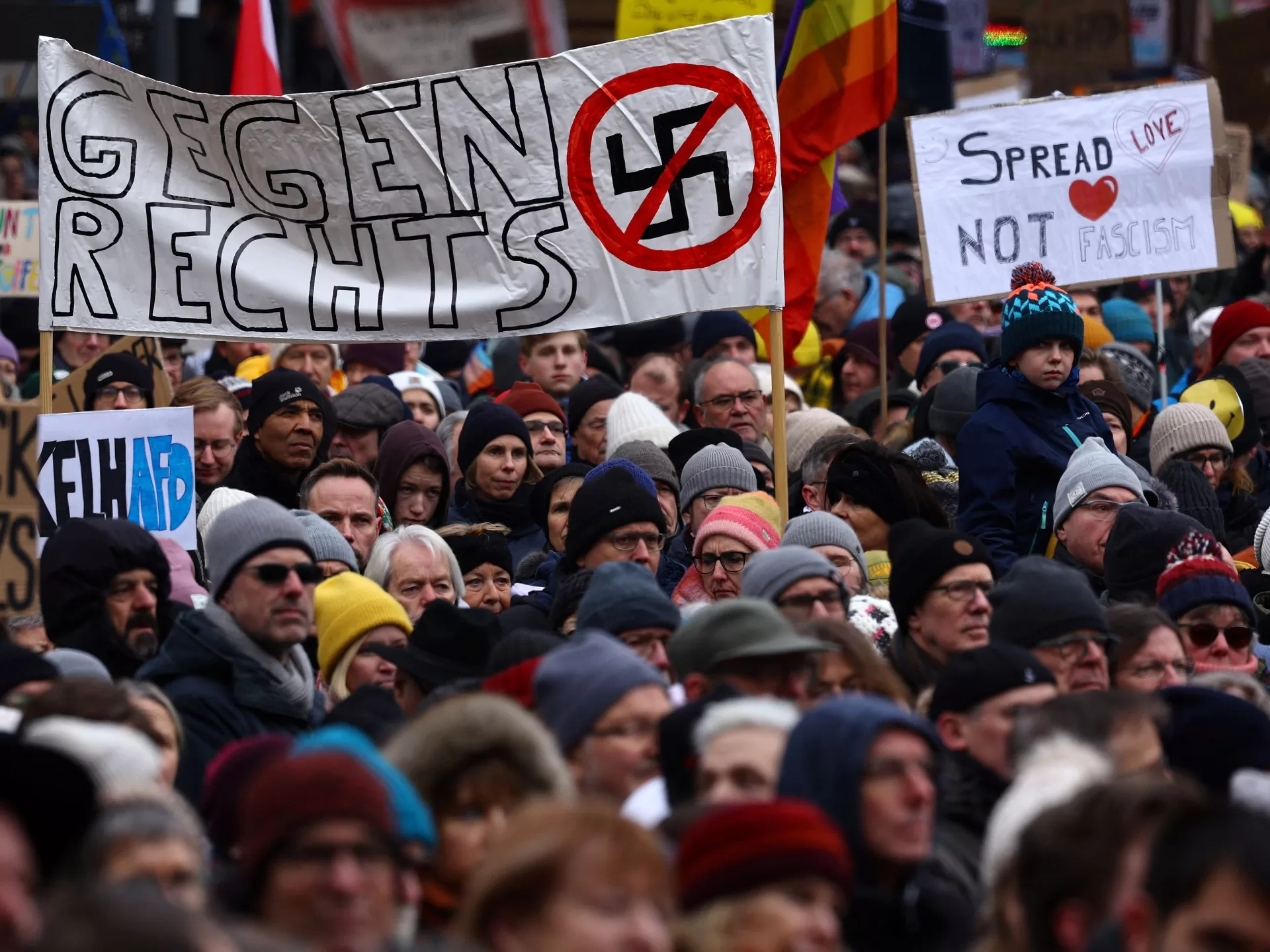She decided to join street protests against the Alternative for Germany (AfD) on January 21 which more than 100,000 Germans ultimately attended.
“It was very important for me personally to be there. As people with migration backgrounds in Germany, we are subject the most to racist attacks, especially from people who vote for the AfD,” Acar told Al Jazeera.
She and her friends took banners with slogans decrying fascists and the hard right. They also wanted to raise their Palestinian flags, seeing the moment as an opportunity to show their solidarity with Gaza amid Israel’s brutal onslaught, and given the AfD’s stance on Palestine.
“[But] I felt a bit nervous to be honest, knowing that the majority of people there will be white Germans. Even though they seem to be against racism, fascism, and the right-wing wave in Germany, they are still also against us,” she said.
The AfD is notoriously hostile towards people with refugee and migrant backgrounds. It also has an aggressive stance on Palestine.
The far-right force has previously shown strong support for Israel, despite Jewish groups describing it as anti-Semitic, and had called for cuts in aid and financial support to Palestinians in October, long before several Western nations pulled funding to UNRWA.
At the time of publishing, AfD officials had not responded to Al Jazeera’s request for comment.
Soon after Acar arrived at the protest, she felt unwelcome.
“As we were making our way to the demonstration, unrolling our flags, immediately, we could see the looks. We could literally feel the looks, the dirty looks, and it didn’t take long until we got attacked,” she said.
Some protesters told them to lower their Palestine flags, saying they did not fit in with the demands of the demonstration.
Others were physical. Acar said that she and her friends were pushed and told: “Go away. Go to your demos. You don’t belong here.”
When she sought help from a woman police officer, she was told that pushing is not considered a criminal offence.
“Honestly, it was sad,” Acar said. “In my head, I constantly had this thought – what if they surround us and start beating us?”
With so many people at the anti-far-right protest, the mobile phone network was down.
Acar and her friends got separated from the rest of a pro-Palestine group of about 150 people.
Once reunited, police circled them and told them to lower their voices.
“We came because we wanted to protest against the AfD’s racist politics and the prevailing racism in Germany in general. Therefore, we assumed we would have the same rights when arriving and during the march until we leave,” said Georg Ismael, a pro-Palestine activist who was also at the demonstration.
At one point, police prevented the group from joining the main protest route, allegedly cornering them for about 90 minutes.
Frustrated and unable to move, the group registered a separate protest with police.
“At a certain point, we were actually blocked from moving in any direction. This is why we were forced to announce and register a separate demonstration. This had never been our intention. The police know this,” said Ismael, who is also a PhD student.
A spokesperson of the Berlin police force told Al Jazeera that a “Stop the War in Gaza” march was reported to them on January 21.
“Before the confirmation of the march route by the police leadership, participants attempted to move towards Friedrichstrasse. This was initially prevented, only to be allowed shortly thereafter, following approval from the police leadership,” the spokesperson said.
“It became apparent that we were effectively prohibited from joining the other demonstrators. To facilitate our movement, the only option we had was to register a spontaneous demonstration titled Stop the War on Gaza,” said Acar.
At the time of writing, the organisers of the anti-AfD protest had not responded to Al Jazeera’s request for comment.
Dror Dayan, a German-Israeli filmmaker who is sympathetic to the pro-Palestine movement, said he is not surprised Acar, Ismael and others were rejected.
“This is not new,” he told Al Jazeera. “The mainstream political centre doesn’t like the far-right to be racist against migrants, but doesn’t like actually listening to migrants just the same, especially when they doubt Germany’s reason of state and show solidarity with Palestine.”
“It’s sad when people protesting genocide are shunned from antiracism demos by people apparently supporting this genocide, but not new or surprising.”
The episode comes as Germany, one of Israel’s strongest European allies, faces increasing allegations of trying to silence pro-Palestinian support.
The state has banned some demonstrations in support of Gaza and heavily scrutinised banners during those that are allowed to go ahead. German President Frank-Walter Steinmeier has called on Arabs in his country to distance themselves from Hamas, a comment that was condemned as an example of collective punishment.
Last month, a group of artists described Germany’s alleged crackdown as “McCarthyist” as they launched a boycott of state-funding institutions.
Looking ahead, further protests against the AfD are expected over the next couple of weeks.
Pro-Asyl, a group that comprises people with migrant backgrounds, will lead a rally on Saturday in Berlin. Its organisers have said all will be welcome at the event, including pro-Palestinian protesters.
